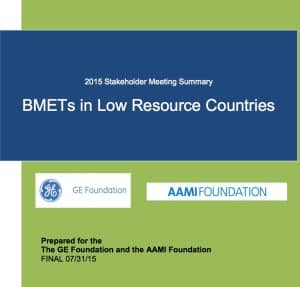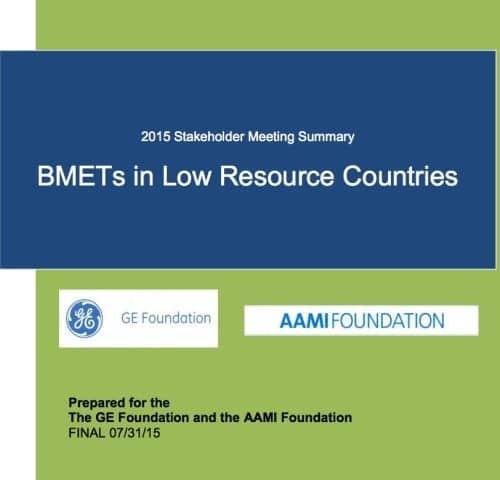
The BMET report is a summary of a 2-day meeting held in June 2015 in Toronto, Canada, at which 55 professionals from various backgrounds and countries engaged in discussions that addressed how best to achieve effective training for BMETs in countries that need their services.
According to the report, “without technology that supports diagnosis and treatment, patients are vulnerable to needless pain and suffering, poor health outcomes, and even death.” The report outlines how better access to emergency care and the use of diagnostic and therapeutic tools would reduce patient mortality in many low-resource countries, yet much of the available equipment in such locations is not functional.
As summarized in the report, the stakeholders at the June 2015 meeting concluded that until there are more skilled BMETs on the ground to keep medical equipment running safely and effectively, developing countries will be stymied in their efforts to improve patient care. Toward that end, the meeting participants identified six crucial next steps, which are:
- Create an international advisory body to assure quality of BMET training based on core competencies.
- Create a global alliance that focuses on the promotion of the HTM profession in low-resource countries.
- Ensure the strict selection of BMET trainees/trainers.
- Engage multiple stakeholders and funders to promote BMETs.
- Create sustainable, scalable funding strategies for BMET training to improve public health outcomes.
- Define metrics for BMET health impact/outcomes.
The report emphasizes that successful training programs must encompass the student life cycle from pre-admission to professional BMET. Further, the report recommends that such programs use local trainers who are “able to converse in the local language, understand local customs, and have a local network on which to rely.”
The report also identifies several other factors that would be crucial to success for training models, including the need for constant evaluation, trainer fluency in both theoretical and practical knowledge, and an understanding of infrastructure challenges.
A final report, which will include specific recommendations for the training models, is due to the GE Foundation in October 2015.




